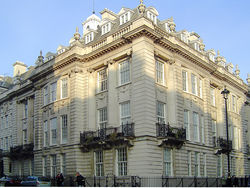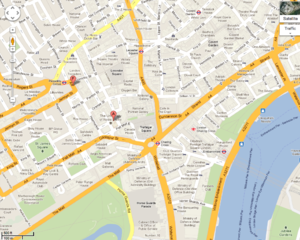London CPS Workshop
 |
Workshop on Cyber-Physical Systems |
 |
Workshop Scope and Purpose
Recent technological developments in sensing, communications, control and computation have created an emerging class of complex systems, called Cyber-Physical Systems. Cyber-Physical Systems are characterized by large numbers of tightly integrated heterogeneous components in a network, which may expand and contract dynamically. Cyber-Physical Systems are very common and are becoming increasingly ubiquitous. The control of such systems presents huge challenges and requires designs drawn from approaches such as those in traditional control, hybrid control systems, discrete event systems, and networked control. In addition, robustness, reliability and security issues for reconfiguring dynamical systems must also be addressed. This integration of different technologies and scientific domains presents new and challenging fundamental problems underlying the theoretical foundations for this class of systems.
Participants
- Frank Allgower
- Karl-Erik Årzén, Simulation of Cyber-Physical Control Systems
- Alessandro Astolfi, Model Reduction of Nonlinear Systems
- John S. Baras, Components, Compositionality and Architectures for Networked CPS
- Antonio Bicci, Trading off Feedforward and Feedback, Remote and Local in the Control of Complex Interconnected Plants
- Eduardo F. Camacho
- Carlos Canudas-de-Wit, CPS in Intelligent Transportation Systems: the Grenoble south ring show case
- Christos Cassandras, Control and Optimization in Cyberphysical Systems: From Sensor Networks to "Smart Parking" Apps"
- Claudio De Persis, Coordination Control in a Cyberphysical Environment
- Marika Di Benedetto, Analysis and Control of Networked Embedded Systems
- Maurice Heemels, Event-Triggered and Self-Triggered Control Design with Guaranteed Performance
- Sandra Hirche, Cyberphysical Systems in Robotics - Challenges and Achievements
- Tor Arne Johansen, Integrated UAV Marine Operation Planning for Surveillance, Oil Spill Observation and Arctic Ice Management
- Xenofon Koutsoukos, Resilient Cooperative Control of Cyber-Physical Systems
- Stefan Kowalewski, Architectural Support for Agile Control Design in CPS
- Kostas Kyriakopoulos, A Framework for Aperiodic Model Predictive Control
- Jan Maciejowski, Some New Developments in Model Predictive Control
- Thomas Parisini, Towards Safe and Reliable CPS: A Learning-Based Distributed Fault-Diagnosis Approach
- Joerg Raisch, Control Hierarchies and Tropical Algebras
- Malcolm Smith
- João Sousa, Coordination Challenges in Networked Vehicle Systems: Are We Missing Something?
- Janos Sztipanovits, Towards Model-Based Software Synthesis for Resilient Control Systems
- Arjan van der Schaft, Bisimulation Theory for Multi-Modal Physical Systems
- Richard Vinter
Organizers
The organizers are all from the College of Engineering at the University of Notre Dame.
- Panos Antsaklis, antsaklis.1@nd.edu
- Bill Goodwine, bill@controls.ame.nd.edu
- Vijay Gupta, Vijay.Gupta.21@nd.edu
Date and Location
The workshop will be on Saturday and Sunday, October 20-21, 2012. It will start Saturday morning and end at approximately noon on Sunday. It will be held at the London Centre of the University of Notre Dame.
|
University of Notre Dame in London 1 Suffolk Street London, SW1Y 4HG |
 |
Accommodations
To be added.
Acknowledgements
The organizers would like to acknowledge the support of the National Science Foundation, the University of Notre Dame, the College of Engineering at the University of Notre Dame and the Department of Electrical Engineering at the University of Notre Dame.